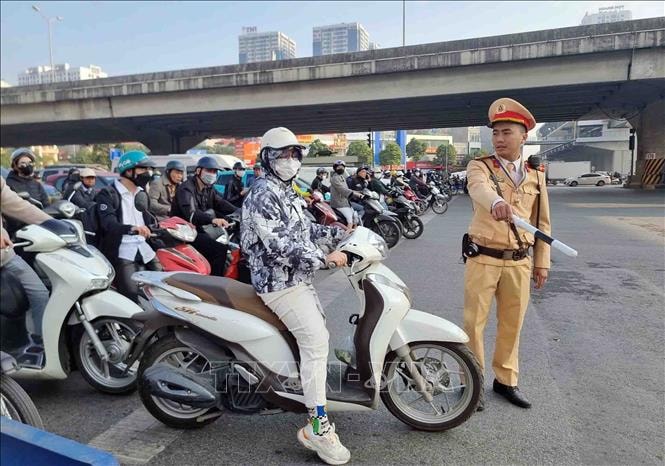Just after a short time of implementing Decree No. 168 of the Government on increasing administrative penalties for violations in the field of road traffic, the appearance of traffic safety and order across the country has changed significantly.

The most obvious impact is that the awareness of traffic participants has changed positively. Traffic violations that were quite common in the past (especially in big cities) such as driving on the sidewalk, going the wrong way, running red lights, not wearing helmets when driving motorbikes, etc. have decreased significantly, especially the violation of running red lights.
According to statistics from the Traffic Police Department (Ministry of Public Security), from January 1 to 6, the traffic police force nationwide handled 71,680 cases of traffic order and safety violations, paying the State Treasury over 187 billion VND; temporarily impounded 560 cars, over 23,600 motorbikes and 1,579 other vehicles, and revoked nearly 9,200 driving licenses.
Looking at the number of vehicles and drivers fined in recent days, it shows that the number of violations has decreased in a positive direction.
Increasing the level of fines not only creates early and remote deterrence and prevention, but also changes the thinking and awareness of law compliance of traffic participants, thereby contributing to reducing and limiting traffic accidents.
The above results also show that Decree No. 168/2024/ND-CP is gradually coming into effect, contributing to building a civilized and healthy traffic culture and environment.
However, public opinion is still concerned and even worried because the current traffic infrastructure has not developed in accordance with actual requirements, traffic organization is not synchronous, and the traffic light system in many localities still has many shortcomings and frequent errors.
The media has recently reported that at many intersections in some large cities or national highways, there are still traffic lights that are not designed according to standards, sometimes dim, sometimes bright, with too little difference in waiting time between green and red lights, making it difficult for drivers to judge. On some provincial roads, the road markings are not clear, causing inconvenience and risks for road users.
In addition, on many national highways, the sign system is confusing, even at one intersection there are up to three different speed signs; the road markings are blurred... making drivers confused and prone to making mistakes due to objective reasons.
Although the Traffic Police Department informed that at traffic light intersections with technical errors, the authorities will not impose fines and when making a record of the violation, the traffic police will coordinate with the traffic light department to extract the camera, compare the violation and the traffic light signal at the time of handling the violation, but what makes many people wonder, with direct fines it can be like that, but what about cold fines? At that time, what can traffic participants use to prove that they are not at fault?
Therefore, many opinions believe that in order for Decree 168 to be truly effective, it is necessary to urgently overcome the shortcomings that have arisen. Along with strictly handling violations, it is necessary to strengthen education on law compliance for traffic participants; and build a synchronous traffic infrastructure.
Furthermore, when handling violations, authorities need to make assessments and distinguish between unintentional and intentional violations to handle them fairly and humanely, instead of applying penalties in a stereotyped and mechanical manner.
Based on the above reality, at the special session on law of the National Assembly Standing Committee on January 6, Vice Chairman of the National Assembly Tran Quang Phuong requested the Ministry of Public Security to coordinate with the Ministry of Transport and localities to re-inspect the entire traffic light system nationwide.
Only when the traffic light system is guaranteed to operate without error can traffic participants feel secure and strictly comply with legal regulations, because no one wants to run a red light and then violate the law, nor does anyone want to be unjustly fined, or "get a bad rap" when violating the law due to objective reasons.
Therefore, along with increasing the level of fines, regular maintenance and upgrading of the road system, traffic signals, signs, surveillance cameras, application of technology in operation, handling of violations, etc. are extremely necessary when implementing Decree 168. Only then can we ensure fairness, transparency and bring great benefits to society in restoring traffic safety and order.